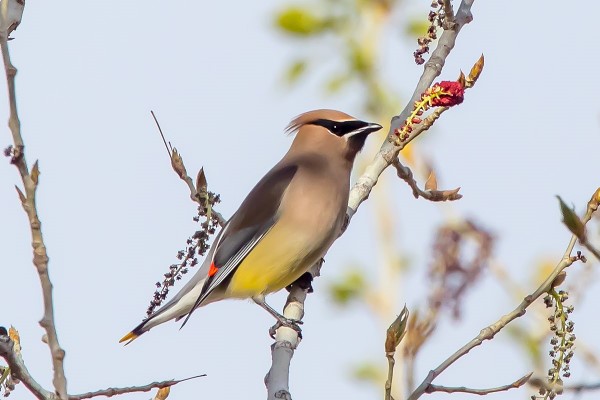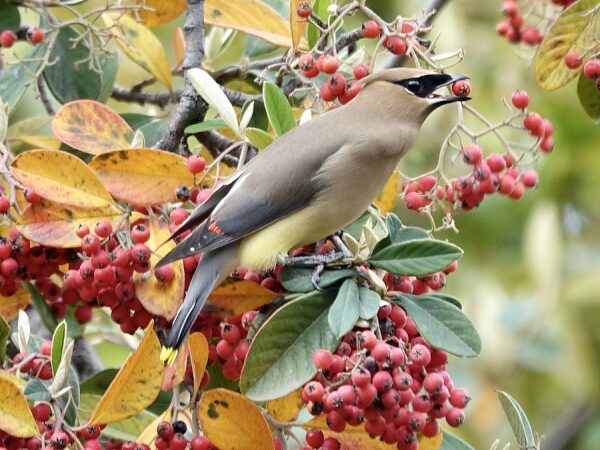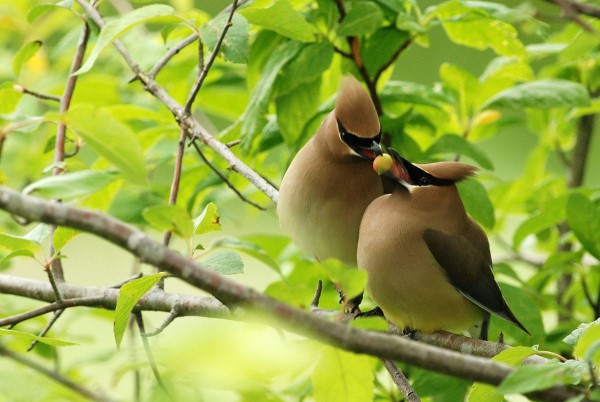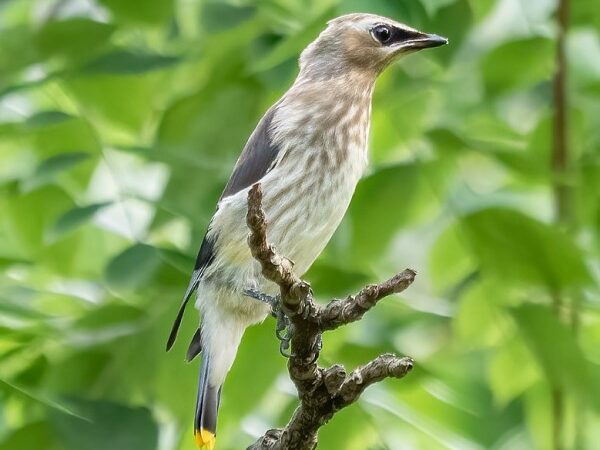In the Midwest, summer berry season is always long awaited, and far too short. In just a few months, we savor fresh strawberry shortcakes, raspberry pies, and a whole assortment of other goodies. So, what if I told you the cedar waxwing spends all winter almost exclusively eating berries?

The Fruit Fanatic
Cedar waxwings (Bombycilla cedrorum) are native to North America, and they call Wisconsin home year-round. You can usually spot them in woodlands, orchards, parks, and even suburban backyards! Cedar waxwings will eat insects in the summer, but in the snowy winter, they’re pretty much completely reliant on berries from last season.2


They actually get their most distinctive markings from their favorite food! Their bright red wingtips and yellow tail tip develop because of the pigment in the fruit they consume.1 Being berry connoisseurs, they aren’t too picky, but their favorite is of course, the juniper berry from the cedar tree.3
Life in the Treetops
Cedar waxwings are very social birds and like to hand out in flocks. These flocks are pretty large and can have hundreds of birds!1
So, how do you find that special someone in such a big community? Male cedar waxwings actually have a pretty extensive courtship process. First, they perform a fancy dance to woo their partner. If that seems to be well received, he’ll present her with gifts like fruit, flower petals, and insects. They’ll pass it back and forth until the female eventually accepts the gift and eats it.2


Cedar waxwings only have one partner each breeding season, so if it’s a match, they’ll start building a nest together! The baby birds will stay in the nest for about 25 days as they parents work together to raise them. After that, they’ll leave to form their own flock!2
The Seed Spreading Songbird


While cedar waxwings are munching on a snack, they’re also helping spread seeds! Cedar waxwings are one of the few fruit-eating bird species that don’t regurgitate the seeds of their snack.2 As they digest, the seeds are carried with them as they journey across meadows, forests, and more! When it’s time, the seeds are deposited in their new home along with some nice fertilizer, AKA bird poop. It’s kind of gross, but very helpful for a little sprout! In fact, juniper berries that have been ingested by cedar waxwings are 1.5-3.5 times more likely to germinate!3 If you want to learn more about seed dispersal, we have a blog all about it! Check it out here.


So that’s the story of the cedar waxwing. For further exploration, visit the Rosemann Family Field Vegetable Garden in the new Carol & Bruce Bell Children’s Garden! Here you can learn more about seed dispersal by animals, and see a gorgeous, larger-than-life sculpture of, you guessed it, the cedar waxwing.
Sources
- “Cedar Waxwing.” American Bird Conservancy, 17 Jan. 2019, abcbirds.org/bird/cedar-waxwing/.
- “Cedar Waxwing.” National Wildlife Federation, www.nwf.org/Educational-Resources/Wildlife-Guide/Birds/Cedar-Waxwing. Accessed 3 July 2023.
- Harry, Drew. “Cedar Waxwing.” Madison Audubon, 12 Apr. 2019, madisonaudubon.org/fff/2018/10/19/cedar-waxwing.






